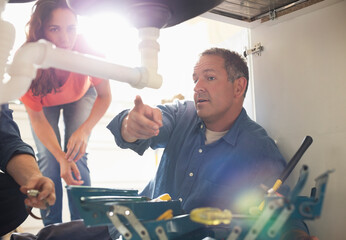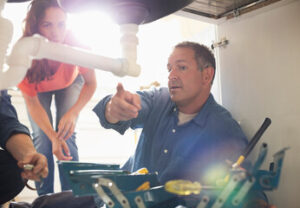Residential Granada Hills Plumber install piping and fixtures for new construction homes, housing blocks, and home renovations. They also repair existing systems.
Plumbing jobs aren’t for everyone, and some people find it more challenging than others. Choosing a career in this field requires a high school diploma and an apprenticeship. There are many different types of plumbing, but a residential plumber typically works on the pipes inside a house or apartment.
Clogged drains and toilets are among the most common problems homeowners encounter. If left untreated, they can be extremely messy, inconvenient, and even dangerous. Fortunately, professional plumbers have the tools and techniques to quickly diagnose and fix these issues.
If you notice that your drains are starting to slow down or are completely blocked, turn off the water supply and call a plumber immediately. They’ll be able to use special drain cleaning equipment to break up and remove stubborn clogs. It’s also a good idea to keep a plunger handy in case of emergency – this simple plumbing tool can dislodge many blockages.
Homeowners can often prevent clogs by being careful about what they put down the drains and toilets. For example, it’s best to flush only human waste and toilet paper down the toilet. Avoid flushing other items, such as sanitary wipes, cotton swabs or paper towels, which can cause blockages. Also, be sure to keep bathroom counters as clear as possible to prevent accidentally knocking items down the drain.
The most serious clogs may require the services of a residential plumber. If you notice that your toilet is flushing very slowly or not at all, it’s likely a sign of a major sewer line clog. Your home’s sewer line carries waste from your sinks, tubs and toilets to the municipal sewer system or septic tank. If one of these lines is clogged, all of your home’s drains will begin to back up.
Other signs of a major clog include unexplained puddles in your yard or unexplained smells coming from your drains and toilets. These can indicate that there is a build-up of sewage or garbage in the pipes, which can cause serious health and safety issues.
If you can’t dislodge a clog with a plunger or chemical drain cleaner, you can try using a plumber’s snake. These devices are available at most hardware stores, and they’re usually made of flexible metal wire that can bend and twist around the clog to break it up or pull it out. You can also find hand-cranked and disposable plastic versions of these snakes that don’t require cranking.
Appliance Installation
Appliances like dishwashers, washers and dryers often require professional installation. If not done correctly, they could malfunction or not work at all. In addition, manufacturers encourage homeowners to use only certified installers to maintain the warranty on their products. If you’re looking for a plumber to install an appliance, always check their website for certifications and client testimonials.
Plumbing professionals must be able to keep up with changing consumer demands. This includes installing eco-friendly fixtures and systems that help reduce energy consumption. It also means educating clients on new product options and how to best use them. For example, smart toilets that let you know when they’re running low on water might be a good investment for some households.
Residential plumbers can also help with home remodeling projects. This might involve moving pipes to accommodate a new kitchen or bath, or it could be as simple as replacing a faucet. If you’re planning a major renovation, it’s a good idea to get the plumbing system in place first.
Offices and other commercial buildings need a more extensive plumbing system than private residences. These spaces might be four to ten stories tall and contain multiple bathrooms, sinks and appliances. Because these systems are used so frequently, they must be designed with health and safety in mind. Commercial plumbers have the training and experience to work on these larger systems. They’ll be able to inspect, repair and maintain them to ensure they’re functioning properly. These plumbers will also be able to handle any emergency situations that might arise in these spaces.
Routine Maintenance
Plumbing systems are important for the health, safety, and comfort of the people who use them. Whether they’re in private residences or commercial spaces, they need to be designed with health and sanitation in mind. In addition, these systems must be maintained regularly to ensure they continue to function properly. This is one reason why it’s important to find a plumber who offers routine maintenance.
When you’re looking for a plumber, be sure to check their website and see what kinds of services they offer. It’s also a good idea to look for reviews and testimonials from past clients. This will give you a good sense of their customer service skills and whether they’re a good fit for your needs.
A residential plumbing repair expert can help you with your home’s plumbing problems, such as clogged drains or toilets. They can also install new fixtures, like faucets and shower heads, and help you maintain your existing plumbing system to keep it working as smoothly as possible. They’ll also help you understand how your home’s plumbing works so that you can take steps to prevent future problems.
The plumbing industry has experienced a lot of change during the pandemic, and many of these changes have had an impact on how homeowners use their homes. Some of these impacts include a slowdown in new construction, as well as a decline in sales of existing homes. However, one effect that has been less obvious is an increase in the number of plumbing repairs being needed by home owners. As a result, residential plumbers have seen an uptick in business as more homeowners turn to them for help with their existing plumbing.
In addition to addressing routine maintenance, these plumbers are also helping residents deal with the impact of the pandemic on their lives and their ability to perform everyday tasks at home. They’re assisting with water conservation efforts, installing and repairing water heaters, addressing water main breaks and conducting other repairs. They’re also helping homeowners navigate the complicated insurance claims process by contacting their insurers on behalf of customers, as well as providing support for residents who are experiencing difficulty finding suitable housing and financial assistance.
Repairing Broken Pipes
Pipes are susceptible to damage from extreme temperatures, rust and corrosion, shifts in the soil around them, and over-pressurization. Often, these factors can lead to a pipe’s burst, which can cause flooding and water damage throughout your home. Fortunately, regular inspections and preventative maintenance from your local plumber can help reduce the likelihood of pipe damage.
When a pipe does burst, it’s critical to take action immediately to limit the damage. The first step is to turn off the main water supply valve if it’s safe to do so. Then, shut off any electrical appliances in the area of the break to avoid electrocution or further water damage. Finally, remove any items that could get wet and use fans or dehumidifiers to dry the affected areas.
Residential plumbers are available to assist with all types of pipe repair and replacement. However, the cost of repairing or replacing your pipes depends on a number of factors. These include the location of the broken pipe, how accessible it is, and the extent of the water damage caused by the burst. In general, pipes that are more difficult to access will be more expensive to repair or replace, such as those in walls or ceilings.
The cost of a pipe repair also depends on the type and severity of the damage, as well as the age and condition of your pipes. Generally, newer pipes are less likely to burst than older, more fragile ones. However, if your pipes are exposed or have a lot of rust or corrosion, they may be more susceptible to damage and may need to be replaced.
Homeowners are responsible for preventing the most common causes of pipe breaks and repairs, such as freezing or over-pressurizing. Taking precautionary measures like adding insulation to your pipes and avoiding putting fats, oils, and other solids down the drains can help keep your pipes in good condition. Finally, check your homeowners insurance to see if the damage to your property from a burst pipe is covered. If not, consider hiring a local plumbing contractor for emergency water damage repair and restoration services.


 Residential plumbers install, repair and maintain plumbing systems in various settings. They can also work in commercial properties, though these jobs are less common and must meet stringent state and local codes and regulations. A good residential plumber will have excellent critical thinking and troubleshooting skills and be able to handle a range of tasks, including examining pipe systems, repairing fixtures, analyzing plumbing emergencies and maintaining water heaters.
Residential plumbers install, repair and maintain plumbing systems in various settings. They can also work in commercial properties, though these jobs are less common and must meet stringent state and local codes and regulations. A good residential plumber will have excellent critical thinking and troubleshooting skills and be able to handle a range of tasks, including examining pipe systems, repairing fixtures, analyzing plumbing emergencies and maintaining water heaters.